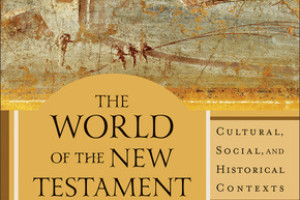The Text that Started It All
I received this text message from a friend: “Quick…need a translation/explanation of Luke 2:49.” I found the necessity of a hurried response to be a bit peculiar. Who would need a translation of a verse so promptly? Nevertheless, I supplied my quick, and rather ‘wooden’, translation from the Greek (καὶ εἶπεν πρὸς αὐτούς· τί ὅτι ἐζητεῖτέ με; οὐκ ᾔδειτε ὅτι ἐν τοῖς τοῦ πατρός μου δεῖ εἶναί με;): “And he said to them, ‘Why [is it] that you were seeking me? Did you not know that it is necessary for me to be in the things which are of my Father?’” My translation is a bit awkward, but very literal. My friend responded that a guest speaker at a congregational meeting was explaining how some words are missing in Luke 2.49 when compared to most English translations and that the passage is actually a lot more ‘cryptic’ than translators would have us to think. My perceptive friend followed this circumstantial explanation with a note of confidence that the speaker “doesn’t know Greek.” My friend inquired as to the education or credentials of this lecturer and discovered that the speaker “claims to have studied Koine Greek” but that the speaker “didn’t seem very confident.” Yet, this speaker was “claiming all these translators are making errors.”
The Intricacies of Translation
Continuing our text messaging conversation, I was asked for “an explanation about the grammar and why it translates that way.” I explained to my friend that it has to do with the dative plural neuter article (τοῖς). I advised that semantically and syntactically, this article may be functioning as a substantive and so can be translated with participial force as a plural demonstrative accompanied by an impersonal pronoun; thus, “those which,” or “those [things] which” would be acceptable English renderings. Other ways of doing this would be: “that which” or “the [things] which.” Some scholars/translators supply another word and have resolved to translate ἐν τοῖς τοῦ πατρός μου as “in my Father’s house” (RSV, NASB, NIV) or “about my Father’s business” (NKJV). Why would anyone do this? It is simple—in v. 46 Jesus’ parents “found him in the temple” (εὗρον αὐτὸν ἐν τῷ ἱερῷ). The term ‘House’ is another name for the temple in Jerusalem. Translators often italicize or bracket off words which do not correspond as closely to the original languages in order to inform readers that the supplied word may not have an equivalent in the original language. Words are supplied by translators of all languages, whether biblical or not, in order to make the message intelligible. Sometimes words or phrases are supplied for contextual reasons as well. Young’s Literal Translation (YLT) renders Luke 2.49 as “in the things of my Father.” The bottom line is this: these biblical translators knew what they were doing. Yes, the whole board of them with all of their formal degrees and education, as surprising as one may find that to be. They are fully aware of what they are doing when they supply words in translation. Translations of single verses are not done in isolation. The surrounding context is taken into account as well as authorial tendencies and contemporary or contextual usage of biblical and extrabiblical texts. There was a lot that went into deciding how to render Luke 2.49 and which word to supply for clarification and semantic precision.
Meanwhile, back at the Ranch…
My friend relayed to me that the speaker was opining how ‘liberties’ were taken by Bible translators since ‘if you check the Greek, those words are not there’ and that these translators are ‘inserting words’. This criticism is simply uncalled for and, as we have seen, completely inaccurate. Such proclamations would only come from a person unfamiliar with the intricacies of translating ancient languages. Furthermore, such criticism instills in the attendees skepticism of biblical scholars and the tedious and erudite translations produced by them. If anything, one should be skeptical of pontifications made by informally trained or misinformed persons who present themselves (whether explicitly or implicitly) as linguistic experts. This is not to discourage students or those who seek to learn the original languages with humility. I encourage such endeavors! However, I discourage unprofessional and unwarranted criticism of scholars by laity. I vented about this observable problem in a previous post titled Excising the Experts.
That was enough excitement for me, and so it was time for me to get back to ‘the [things] which’ I was doing before my little texting ordeal.





Leave a Reply
Your email is safe with us.